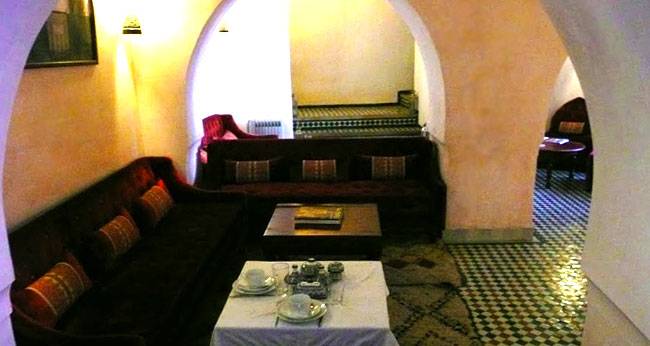

Typical traditional Moroccan houses – known as Riads have been restored and converted into hotel-type accommodation for tourists visiting Morocco to give them an authentic experience of staying in a typical traditional Moroccan house.

A Riad is a traditional Moroccan home with an interior garden/courtyard which would typically include a fountain. A Riad is designed to be inward focused, thus the rooms of a Riad would have windows facing the interior courtyard and not the outer walls facing the street. This tradition comes from the belief in family privacy and also acts as protection from the weather in Morocco. In some instances the door of the Riad leading to the street would be simple and unassuming, hiding the beauty of and lending privacy to this typical and traditional Moroccan house.
Riads where in centuries past the stately city homes of the wealthiest citizens of Morocco such as merchants and courtiers.

As Riads are the traditional homes of the people of Morocco, they can be found throughout the country even today. The styles of these Riads have changed over the years, but the basic structure is used in Moroccan architectural designs even today.
The city of Marrakech is famous for its Riad accommodation– these Riads may have been converted to high-end hotels such as a boutique hotels, or offer more modest accommodations. The costs of staying in such Riads in Marrakech, Morocco can range from very expensive to affordable. Most of the Riads turned hotels in Marrakech are centuries old, having been bought and restored by foreigners who saw something special in this type of accommodation when visiting Morocco.

The Riads that operate as boutique hotels could be a converted palace or the home of a wealthy family. Normally having two or more storey’s, these Riads can even have three or more inner courtyards, with each courtyard dedicated to different interests – a garden, an outdoor restaurant or even accommodate a swimming pool. These Riads may also offer
These Riads turned boutique hotels still retain the traditional architecture of the Moroccan house with its carved doorways, and hand-painted doors and shutters, while facilities are modernized to include plunge pools, spa services and even a Jacuzzi in some rooms! Most of the vast room in the Riad will be lavishly decorated in traditional styles and sometimes may also have their own private balcony – ideal for the honeymooning couple.
The Riads that have been converted to more modest forms of modern accommodation will also still remain true to the Moroccan architecture of a by-gone era, and allow you the experience of staying over at a charming and affordable Moroccan traditional house. However do keep in mind that the facilities will be more simple and limited.
Due to the architectural style of the Riad, once you get to your room you will leave behind the noise and bustle of the busy streets.

If all the above is not reason enough to stay over in a Riad while holidaying in Morocco, then here are a few more reasons why…
1. An experience not to be missed…. a taste of true medieval living found mainly in the Old Medina in Marrakesh
2. A place to relax and get pampered and receive a personalized service after a hectic day spent sightseeing and/or haggling with vendors
3. To see first-hand and explore the beauty and architecture that is integral to a Riad
4. The food – most Riads offer good food in their in-house restaurants
5. If traveling in a large group, some of these Riads will offer Muslim travelers an opportunity for privacy. As most Riads have only a few rooms – rent them all and the entire Riad and the staff are yours to enjoy!
Sakina has over 20 years of experience in the field of corporate communications; having worked for a leading Annual Report Production House dealing with top corporates of Sri Lanka and overseas, and later as the Group Communications Specialist for a Sri Lankan conglomerate for their overseas plantations business. She is well-versed in the production process of annual reports, sustainability reports, corporate videos and other corporate communication media. She also has experience in Social Media Marketing and works to increase and improve social media presence of corporates and small niche market businesses. Today, she works as a freelance writer and undertakes consultations on corporate communications and social media related projects. She enjoys writing for blogs on topics of interest.